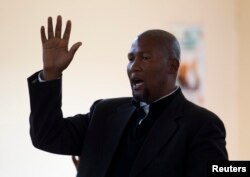JOHANNESBURG —
A South African court ruled Wednesday that Nelson Mandela’s grandson has just hours to move the bodies of three of Mandela’s deceased children back to the village of Qunu. The battle over the burial place has grabbed headlines in South Africa, as the ailing Mandela remains in critical condition.
As anti-apartheid hero Nelson Mandela remains in critical condition in a Pretoria hospital, his family has grabbed headlines with a vicious legal battle that strikes morbidly close to home for the ailing leader.
Two years ago, his grandson Mandla moved the bodies of three of Mandela’s deceased children to Mvezo, the town in the Eastern Cape province where Mandela was born and where Mandla Mandela is chief.
Some 16 Mandela relatives recently challenged that decision in court, saying that Mandla Mandela had not sought permission or even told them about the move.
The graves had previously been in Qunu, the nearby town where Mandela spent much of his childhood and where he settled in his retirement.
On Wednesday, after a bitter and protracted battle, a judge in the Eastern Cape city of Mthatha ruled in favor of the family bloc. Around noon, he ruled that Mandla Mandela had until 3 p.m. to return the bodies to their former resting place.
Mandla Mandela did not answer repeated calls seeking comment. His aunt Makaziwe (also Mandela) was one of the family members who opposed him.
“This is a private Mandela issue, it will remain so. I will not comment on it,” she said.
But the battle may not be over yet, said police spokesman Lt. Col. Mzukisi Fatyela. He spoke to news agencies in Mthatha on Tuesday.
“The members of the family went to the station and they opened a case. Now the case they opened is a tampering with the graves, against Mandla, and after the docket was opened we have started with our investigation but the docket will be sent to the senior public prosecutor for a decision," he said. "Then we will know exactly whether we need to continue with the prosecution or not. But we will do our investigation and then the docket will be handed over to the senior prosecutor."
Mandela spent 27 years in prison for fighting South Africa’s apartheid system. He was then elected South Africa’s first black president in the nation’s first all-inclusive elections in 1994.
The 94-year-old Nobel Peace laureate was taken to a Pretoria hospital on June 8 for a recurring lung infection. He slid into critical condition 10 days ago and remains there.
As anti-apartheid hero Nelson Mandela remains in critical condition in a Pretoria hospital, his family has grabbed headlines with a vicious legal battle that strikes morbidly close to home for the ailing leader.
Two years ago, his grandson Mandla moved the bodies of three of Mandela’s deceased children to Mvezo, the town in the Eastern Cape province where Mandela was born and where Mandla Mandela is chief.
Some 16 Mandela relatives recently challenged that decision in court, saying that Mandla Mandela had not sought permission or even told them about the move.
The graves had previously been in Qunu, the nearby town where Mandela spent much of his childhood and where he settled in his retirement.
On Wednesday, after a bitter and protracted battle, a judge in the Eastern Cape city of Mthatha ruled in favor of the family bloc. Around noon, he ruled that Mandla Mandela had until 3 p.m. to return the bodies to their former resting place.
Mandla Mandela did not answer repeated calls seeking comment. His aunt Makaziwe (also Mandela) was one of the family members who opposed him.
“This is a private Mandela issue, it will remain so. I will not comment on it,” she said.
But the battle may not be over yet, said police spokesman Lt. Col. Mzukisi Fatyela. He spoke to news agencies in Mthatha on Tuesday.
“The members of the family went to the station and they opened a case. Now the case they opened is a tampering with the graves, against Mandla, and after the docket was opened we have started with our investigation but the docket will be sent to the senior public prosecutor for a decision," he said. "Then we will know exactly whether we need to continue with the prosecution or not. But we will do our investigation and then the docket will be handed over to the senior prosecutor."
Mandela spent 27 years in prison for fighting South Africa’s apartheid system. He was then elected South Africa’s first black president in the nation’s first all-inclusive elections in 1994.
The 94-year-old Nobel Peace laureate was taken to a Pretoria hospital on June 8 for a recurring lung infection. He slid into critical condition 10 days ago and remains there.





